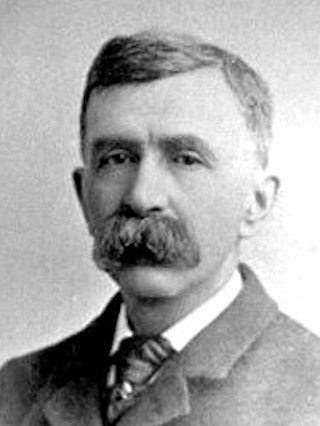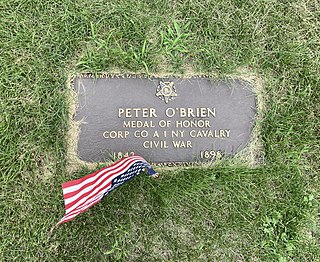
The 1st West Virginia Cavalry Regiment served in the Union Army during the American Civil War. Although it started slowly, it became one of the most active and effective of the West Virginia Civil War regiments—and had 14 Medal of Honor recipients, the most for any West Virginia regiment during the war. It was originally called the 1st Virginia Cavalry, not to be confused with the Confederate 1st Virginia Cavalry. Some reports added "Union," "Loyal" or "West" when identifying this regiment. After the Unionist state of West Virginia was officially admitted to the Union in 1863, the regiment became the 1st West Virginia Cavalry Regiment. The National Park Service identifies it as the 1st Regiment, West Virginia Cavalry.
Hartwell Thomas Benton Compson was an American military officer who received the Medal of Honor for heroism in the American Civil War.
James Madison was a Sergeant in the United States Army and a Medal of Honor recipient for his role in the American Civil War. "James Madison" was an alias, his true name was James Congdon.

George Ladd was a private in the Union Army and a Medal of Honor recipient for his role in the American Civil War.

Richard H. Cosgriff, Sr., was a Union Army soldier in the American Civil War and a recipient of the United States military's highest decoration, the Medal of Honor. An Irish immigrant, his family eventually settled in Wisconsin, where he would spend most of the rest of his life. Enlisting in an Iowa cavalry regiment, he was awarded the Medal of Honor for capturing a Confederate battle flag during an engagement in the last month of the war. After returning to Wisconsin, he worked as a businessman in the lumber and printing industries until his death at age 64.

Christopher C. Bruton (1841–1867) was a Union Army officer during the American Civil War. He received the Medal of Honor for gallantry during the Battle of Waynesboro, Virginia fought on March 2, 1865. It was the final battle for Confederate Lt. Gen. Jubal Early, whose force was destroyed.

For the federal official appointed see Charles William Anderson
Thomas A. Anderson was a United States soldier and native of Pennsylvania who fought with the Union Army as a corporal in Company I of the 1st West Virginia Cavalry during the American Civil War. He was awarded his nation's highest award for valor, the U.S. Medal of Honor, for capturing the flag of a Confederate regiment during the Battle of Appomattox Station on April 8, 1865. The award was conferred on May 3 of that same year.
John Miller won a Medal of Honor for his service during the American Civil War. He was born Henry Fey.
Lieutenant Henry G. Bonebrake was an American soldier who fought in the American Civil War. Bonebrake received the country's highest award for bravery during combat, the Medal of Honor, for his action during the Battle of Five Forks in Virginia on 1 April 1865. He was honored with the award on 3 May 1865.

The 8th New York Cavalry Regiment, also known as the "Rochester Regiment," was a regiment of the Union Army that fought during the American Civil War. It was a volunteer unit organized in Rochester on November 14, 1861, and left the state on November 29. It was mustered out on June 27, 1865.
Private Warren Carman was an English soldier who fought in the American Civil War. Carman received the United States' highest award for bravery during combat, the Medal of Honor, for his action during the Battle of Waynesboro in Virginia on 2 March 1865. He was honored with the award on 26 March 1865.
Private Michael Crowley was an American soldier who fought in the American Civil War. Crowley received the country's highest award for bravery during combat, the Medal of Honor, for his action during the Battle of Waynesboro in Virginia on 2 March 1865. He was honored with the award on 26 March 1865.
Private David Edwards was an American soldier who fought in the American Civil War. Edwards received the country's highest award for bravery during combat, the Medal of Honor, for his action during the Battle of Five Forks in Virginia on 1 April 1865. He was honored with the award on 10 May 1865.

Andrew Kuder was an American soldier who fought in the American Civil War. Kuder received his country's highest award for bravery during combat, the Medal of Honor. Kuder's medal was won for capturing the flag during the Battle of Waynesboro on March 2, 1865. He was honored with the award on March 26, 1865.
Charles A. Goheen was an American soldier who fought in the American Civil War. Goheen received his country's highest award for bravery during combat, the Medal of Honor. Goheen's medal was won for capturing the flag at the Battle of Waynesboro in Virginia on March 2, 1865. He was honored with the award on March 26, 1865.

Peter O'Brien was an American soldier who fought in the American Civil War. O'Brien received his country's highest award for bravery during combat, the Medal of Honor. O'Brien's medal was won for capturing a Confederate flag, and an officer with his horse and equipment, at the Battle of Waynesboro, Virginia, on March 2, 1865. He was honored with the award on March 26, 1865.
Daniel Armer Kelly was an American soldier who fought in the American Civil War. Kelly received his country's highest award for bravery during combat, the Medal of Honor. Kelly's medal was won for his extraordinary heroism during the Battle of Waynesboro, in Virginia on March 2, 1865. He was honored with the award on March 26, 1865.
Harry Harvey, originally named Harry Huckman, was a member of the United States Army who fought for the Union during the American Civil War, where he was awarded the Medal of Honor. He was born on December 14, 1846, in England, but moved to Rochester, New York. He entered service in Rochester, New York, and became a Corporal of Company A of the 22nd New York Company. He was awarded the Medal of Honor for action on March 2, 1865, in Waynesboro, Virginia. There, he is cited as capturing the "flag and bearer, with two other prisoners." He was issued his Medal of Honor on March 26, 1865. Harvey died on April 2, 1896, in Syracuse, New York, and was buried in Myrtle Hill Cemetery.

Robert Frank Shipley was a first sergeant in the United States Army who was awarded the Medal of Honor for gallantry during the American Civil War. Shipley was awarded the medal on 10 May 1865 for actions performed at the Battle of Five Forks in Virginia on 1 April 1865.









